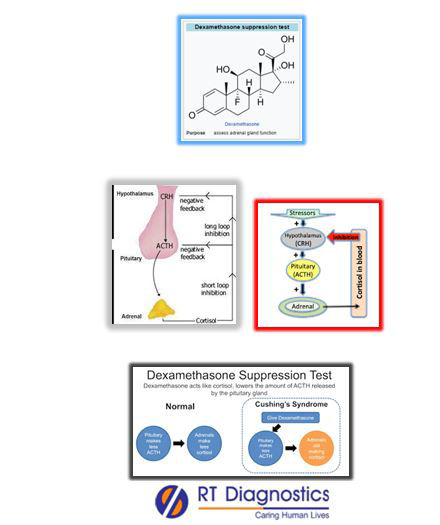Dexamethasone Suppression rate:
Why Dexamethasone Suppression Test?
CLINICAL INFORMATION
Dexamethasone is a synthetic (exogenous) steroid hormone, an analogue of endogenous hormone - Cortisol (Glucocorticoid). Dexamethasone is a corticosteroid type of synthetic medicine for treatment. Its prescription or brand names are – Decadron, Dexamethasone intensol, Soluex, Baycadron etc. Dexamethasone is used in the treatment, of anti-inflammatory medicine ( for severe allergies, edema, breathing disorders, blood cell disorders, multiple sclerosis, GI disorders like ulcerative colitis and its associated diseases, lupus, psoriasis, certain types of arthritis etc). In normal physiology, when the Pituitary gland secretes the adrenocorticotropic hormone – ACTH, it triggers the adrenal glands to synthesize cortisol. When excess cortisol is present in the blood, by negative (regulatory feedback) mechanism, it reduces the ACTH levels (secreted by the pituitary gland). Therefore Dexamethasone (exogenous steroid) being a ligandanalog(the endogenous hormone in the body), provides negative feedback to the pituitary to suppress ACTH secretion (hence helps to check the response of the body’s physiological function). Cushing’s syndrome/disease is a condition where excess Cortisol is produced by the body. Dexamethasone (overnight) Suppression Test - DST screens (response of the body) to measure endogenous cortisol (synthesized by the adrenal glands) levels in the blood. This test is performed typically to diagnose (especially to check) for Cushing’s syndrome – measures the response of the adrenals to ACTH. As a result in suspected patients with Cushing’s syndrome, (unlike normal response in healthy individuals) cortisol levels stay very high. Hence this Dexamethasone suppression test (measures if ACTH secretion by pituitary can be suppressed – as a normal physiological process or not) confirms Cushing’s syndrome in patients. Moreover, there is different types of Dexamethasone (overnight) suppression test, they are low dose, a high dose test, intravenous DST, Dexamethasone DST etc. This test is also used in suspected pituitary or adrenal disorders, pituitary or adrenal tumours etc. Clinical manifestations in high cortisol patients present with signs and symptoms of obesity, round or moon face, fragile and/or thick skin, purple lines on the abdomen, weak muscles, acne, high BP, low potassium levels, high bicarbonate levels, high glucose etc. High levels of ACTH may be a sign of Addison’s disease, adrenal hyperplasia, Cushing’s disease, ectopic ACTH syndrome /ectopic tumours etc.

General Instructions:
Sample Requirement: Specimen - Blood Sample collected from the (cubital) vein. Test Preparation: To estimate the levels of exogenous dexamethasone in the blood, before performing endogenous hormones like cortisol, ACTH etc.
NOTE - Sample for specimen collections may vary based on the patient’s condition/cases according to the patient’s presenting complaints/signs or symptoms:
SPECIMEN REQUIREMENT (Special or Rare Cases) - As instructed and guided by Physician / Clinician / Pathologist / as per Laboratory’s requirements, according to procedures and protocols.
This Multi-Specialty Clinical Referral Laboratory RTDIAGNOSTICS provides precise and accurate tests with an extensive range of testing services to the medical centres to help in the diagnosis and identification of pathology in the test specimens for infectious diseases and also to evaluate the function of organ systems of the patient. It prevents further complications and helps to stabilize and restore health to near normalcy at the earliest without delay.



